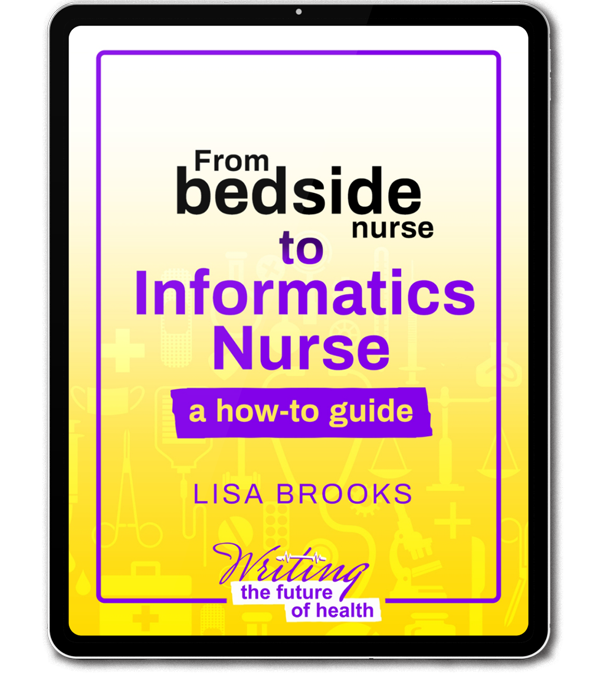A lot of nurses considering graduate school programs think their only option is to become a Nurse Practitioner. Half of the nurses I speak to do not even know what Nursing Informatics is. So when I mention I have a Master’s of Science in Nursing Informatics, they always ask: ‘Is that better than being a Nurse Practitioner?’
Short answer: It is completely different from being a Nurse Practitioner.
Long answer: Well, that is the purpose of this article. Deciding between Nursing Informatics vs Nurse Practitioner as a career choice really depends on the individual nurse. The right fit depends on what you want from your career.

What is Nursing Informatics?
If you are new to this blog, I wrote a whole article about what Nursing Informatics is that you can read here. It explains the details of what Informatics Nurses do, where we work, and what skills you need.
To keep it brief here, Nursing Informatics is a combination of Nursing, Computer Science, and Data Science. Informatics Nurses use technology to solve clinical problems and improve health outcomes. We are the bridge between clinical and technical, and are responsible for making sure technology is user-friendly and helpful for healthcare workers.
A master’s degree or certification is not required to become an Informatics Nurse. However it can be helpful if you want to climb the career ladder, or want a structured program to guide you into this field. There are now resources available for how to enter this field without a degree, but these did not exist when I started. I got my Master’s of Science in Nursing (MSN) in Nursing Informatics to help me make the transition from bedside nurse to Informatics Nurse.

There are no specific continuing education requirements for Informatics Nurses, but most take classes and attend conferences on topics covering health technology, data analytics, and quality improvement.

What is a Nurse Practitioner?
Nurse Practitioners (NPs) are advanced practice registered nurses (APRNs) who are licensed, autonomous clinicians. They may be specialized in a particular area, such as pediatrics, gerontology, or oncology. They require at least a master’s degree to practice, and many roles prefer a doctor of nursing practice (DNP).
NPs are licensed to order tests, diagnose, and prescribe treatments and medications. What Nurse Practitioners can do depends on the state where they practice. This essentially comes down to whether they can work independent of a physician or not.

Nurse Practitioners are required to be board certified, and have continuing education requirements for clinical practice.

Nursing Informatics vs Nurse Practitioner – Key Differences
Difference #1 – Direct patient care: Nurse Practitioners practice in a clinical setting performing direct patient care. Informatics Nurses do not do direct patient care, even though they may also work in a clinical setting.
Difference #2 – Remote work options: Informatics Nurses have much more flexibility in work location, with some nurses working remotely full-time. This allows nurses who want to live the laptop lifestyle and travel throughout the year to do so.
With telehealth becoming widespread, there are now more options for Nurse Practitioners to work remotely. In this capacity they can provide video visits to patients. However, the majority of Nurse Practitioners are not able to work remotely since they provide direct patient care.
Difference #3 – Focus of graduate education: First of all, you do not need graduate education to get into Nursing Informatics. In fact, most of the Informatics Nurses I met over the years got into this field through work experience. However, you may want to consider graduate education in Nursing Informatics if you intend to climb the career ladder. Some roles like Director and Vice President of Clinical Informatics assume candidates have master’s degrees.
The purpose of a Master’s Degree in Nursing Informatics is different than it is for a Nurse Practitioner. In Nursing Informatics, higher education prepares nurses to be leaders in technology, operations, and process improvement. The coursework covers areas like clinical quality, data-driven decisions, leadership, and system implementation.
Graduate education for Nurse Practitioners is focused on advanced clinical training beyond their registered nurse education. Coursework provides nurses with additional clinical competencies they can use to practice in different care settings.


So, Nursing Informatics vs Nurse Practitioner – which one is better?
While I understand why nursing students and early career nurses might ask this question, it is not a question that makes sense from a broader perspective. The question to ask instead is ‘Which one best fits me and my career goals?’
And even then I must point out that the two career paths are not opposed to each other. You can in fact get both degrees – you could become a Nurse Practitioner and get a certificate in Nursing Informatics. There is no rule that says you must pick one and only one.
Here are some things to think about to determine what fits you and your career plans:
Is practicing direct patient care part of your future?
If direct patient care is important to you, you are physically able to do it, and you can see doing it for a long time, then becoming a Nurse Practitioner may be the right path. It is an opportunity to learn and apply more advanced clinical skills. Nurse Practitioners are becoming the primary care providers of choice in many locations.
As an Informatics Nurse, you can still practice patient care as an RN or LPN, which is what I did per diem for a number of years. But the full-time role does not involve bedside care, so that is something to be aware of.
Nursing has the highest rate of nonfatal work-related injuries. It is not uncommon for nurses to sustain injuries that make direct patient care physically impossible. There are also many nurses who realize direct patient care is simply not a good fit, and there is nothing wrong with that. It is better to know it and find a new path, than to take it out on patients.

Do you like technology and innovation?
There is no question that if you get excited about new technology and innovation, Nursing Informatics is calling your name. It is the field to be in if you want to be directly involved in designing, building, and implementing new solutions in healthcare. It is also a field that is growing rapidly and the need for Clinical Informatics professionals has never been greater.
As a Nurse Practitioner, you can still be involved in technology and innovation, particularly as a Subject Matter Expert (SME). When new tools come to your workplace, you can help select the ones that best fit your processes, and provide input on use. However, your full-time role does not involve implementing new technology, so that is something to be aware of.
How much interaction with executives can you imagine in your career?
Informatics Nurses interact with executives a lot…and I mean A LOT. We are the go-to people for new processes and systems, and are often part of the leadership team. One positive is that we are part of big decisions from the beginning. This means we can influence the direction leaders take. We also tend to have a lot of support for building our careers since we know who is in charge of each area.
The downside is there can also be politics to manage. There may be executives who see things completely differently from each other, and use you as their go-between. Or there may be executives who like showing everyone what they know, so they interrogate every piece of information you put in front of them.
If you are someone who likes interacting with executives and can deal with the politics that go with it, Nursing Informatics might be a fit. That is not to say Nurse Practitioners never deal with politics. There are plenty of big egos and drama in clinical settings as well. But to be an Informatics Nurse you have to be comfortable being in front of executives on a regular basis.
How important is location flexibility to you?
As I mentioned before, if you see yourself living the laptop lifestyle and traveling the world, Nursing Informatics is an area where you can do that. Even before the pandemic, many Informatics Nurses worked remotely at least part-time. It is also one of the highest paying nursing roles that can be done remotely.
Nurse Practitioners typically have less location flexibility, but that does not mean they have none. There are NPs who work as travel nurses and take assignments in different locations. Also, as I mentioned earlier, there are more telehealth companies hiring Nurse Practitioners. But, for the most part, NP roles require being in a particular location full-time.
How much do you like working with other nurses?
If you cannot stand working with other nurses, do not become an Informatics Nurse. You will spend a good amount of time talking with nurses, getting requirements from nurses, and teaching technology to nurses. If you do not like nurses, you will not like this role.
As a Nurse Practitioner, in many states you have the option to open your own practice where you can decide who else works there. You can choose which nurses you hire, and have ultimate control over who your co-workers are. This can be very appealing for anyone sick of their peers.

Key Takeaways:
Nursing Informatics is a combination of Nursing, Computer Science, and Data Science. Informatics Nurses are the bridge between clinical and technical. Nurse Practitioners, on the other hand, are advanced practice registered nurses who are licensed, autonomous clinicians.
The big differences between Nursing Informatics vs Nurse Practitioner include direct patient care, location flexibility, and the focus of their education. Nurse Practitioners do direct patient care, and Informatics Nurses do not. However that also means Informatics Nurses have more options to work remotely. NPs have limited job options that involve remote work.
In the end, which one is better for you depends on what your career goals are. Keep in mind your goals may change over the course of your nursing career. You can always try new areas or go back to school. You have options no matter which path you choose.

Found this topic interesting? You may have the makings for a great Informatics Nurse! Check out From Bedside Nurse to Informatics Nurse: A How-To Guide in our online store, or by clicking here!







0 Comments